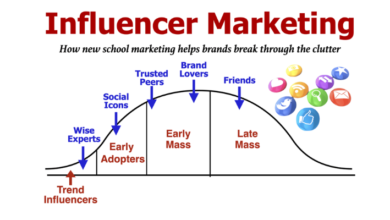Power of Artificial Intelligence (AI) in Digital Marketing

In today’s Artificial Intelligence Digital Marketing landscape, businesses are constantly seeking innovative strategies to stay ahead of the competition. One such strategy that has revolutionized the marketing industry is the use of Artificial Intelligence . By leveraging the capabilities of AI, businesses can unlock a world of opportunities to enhance their digital marketing efforts.
In this article, we will explore the applications, benefits, challenges, and future trends of AI in digital marketing, providing you with valuable insights to harness its power for your business.
I. Digital marketing uses for artificial intelligence
- Personalized Content Recommendation: AI(Artificial Intelligence)-powered algorithms play a crucial role in delivering personalized content recommendations to users. These algorithms analyze user behavior, preferences, and historical data to present tailored content suggestions. By providing relevant and engaging content, businesses can significantly improve user engagement and conversions. Personalized content recommendation algorithms have been proven to increase revenue per visitor by 30%.
- Predictive Analytics and Customer Behavior Analysis: AI enables marketers to predict customer behavior and anticipate their needs. Through predictive analytics, businesses can identify patterns, trends, and insights from vast amounts of data. By understanding customer behavior, businesses can optimize their marketing strategies and deliver highly targeted campaigns. Companies using AI-driven predictive analytics achieve an average 15% increase in customer retention.
- Chatbots and Virtual Assistants: AI(Artificial Intelligence)-powered chatbots and virtual assistants have transformed customer service and support. These intelligent bots can provide instant responses to customer queries, offer personalized recommendations, and even facilitate transactions. A significant percentage of consumers prefer using chatbots for quick communication with brands.
- Sentiment Analysis and Social Listening: AI algorithms can analyze social media conversations and sentiment to gauge customer opinions and reactions. By monitoring social media mentions, businesses can identify emerging trends, track brand sentiment, and proactively address customer concerns. Responding to customer queries on social media platforms helps build trust and credibility.
- Programmatic Advertising: AI-powered programmatic advertising automates the ad buying process, allowing businesses to target specific audiences and optimize ad placement in real-time. This data-driven approach helps maximize the return on ad spend and improve overall campaign performance. Programmatic advertising spend is projected to reach a substantial amount by 2022.
II. Benefits of AI(Artificial Intelligence) in Digital Marketing
- Improved Customer Targeting and Segmentation: AI enables businesses to segment their customer base more effectively, allowing for personalized and targeted marketing campaigns. By understanding customer preferences and behaviors, businesses can tailor their messages and offers, resulting in higher conversion rates and customer satisfaction. Personalized experiences lead to a higher likelihood of purchase.
- Enhanced User Experience: AI(Artificial Intelligence)-driven technologies such as chatbots, voice assistants, and recommendation engines enhance the user experience by providing instant and relevant information. By streamlining user interactions, businesses can create seamless and enjoyable experiences, fostering customer loyalty and advocacy. Positive experiences are vital, as customers are more likely to stop doing business with a brand after one bad experience.
- Real-time Data Analysis and Decision Making: AI empowers marketers to make data-driven decisions in real-time. By analyzing vast amounts of data, businesses can gain valuable insights into customer behavior, campaign performance, and market trends. This allows for agile decision-making and the ability to optimize marketing strategies for maximum impact. Data-driven organizations are more likely to acquire and retain customers.
- Cost Optimization and Efficiency: AI automation reduces manual effort and streamlines marketing operations, leading to cost savings and improved efficiency. By automating repetitive tasks such as data analysis, reporting, and campaign optimization, businesses can allocate resources more effectively and focus on strategic initiatives. AI has the potential to boost business profitability significantly.
III. Challenges and Considerations in Adopting AI in Digital Marketing
- Data Privacy and Security: The use of AI involves the collection and analysis of large volumes of user data. It is crucial for businesses to prioritize data privacy and ensure compliance with regulations such as the General Data Protection Regulation (GDPR). Implementing robust data security measures and obtaining explicit user consent are essential to build trust and protect customer information.
- Ethical Use of AI in Marketing Practices: As AI becomes more sophisticated, ethical considerations arise. Marketers must ensure that AI applications are transparent, fair, and respectful of user privacy. Clear guidelines and ethical frameworks should be established to govern AI-driven marketing practices, safeguarding against discriminatory targeting or unethical data usage.
- Skill Gap and Workforce Adaptation: The integration of AI(Artificial Intelligence) into digital marketing requires a workforce with the necessary skills to leverage its potential. Upskilling employees and hiring AI experts can bridge the skill gap and facilitate successful AI implementation. Continuous learning and development are essential as AI-related skills are among the fastest-growing job categories.
IV. Future Trends and Possibilities of AI in Digital Marketing
- Voice Search and Virtual Assistants: The rise of voice-activated devices and virtual assistants presents new opportunities for marketers. Optimizing content for voice search and leveraging virtual assistants can help businesses reach a wider audience and provide seamless brand experiences. A significant percentage of searches are projected to be voice-based in the near future.
- Augmented Reality (AR) and Virtual Reality (VR): AI-powered AR and VR technologies enable immersive and interactive brand experiences. By integrating AI (Artificial Intelligence) into AR and VR applications, businesses can create personalized and engaging campaigns that captivate audiences. AR ads have shown superior engagement and recall compared to traditional display ads.
- Hyper-Personalization and Contextual Marketing: AI-driven personalization will continue to evolve, allowing businesses to deliver highly contextual and relevant marketing messages. By leveraging real-time data and AI algorithms, businesses can create dynamic campaigns tailored to individual preferences and behaviors. Marketers report measurable improvements from personalization efforts.
V. Steps to Implement AI(Artificial Intelligence) in Digital Marketing
- Assessing Business Needs and Objectives: Evaluate your marketing goals and identify areas where AI can add value. Determine the specific use cases, such as content recommendation, customer segmentation, or chatbot implementation, that align with your business objectives.
- Identifying AI Solutions and Tools: Research and select AI solutions and tools that align with your identified use cases. Consider factors such as scalability, ease of integration, and compatibility with your existing marketing technology stack.
- Data Collection and Preparation: Ensure you have a robust data collection strategy in place to gather relevant data for AI analysis. Clean and preprocess the data to ensure accuracy and quality, as AI algorithms heavily rely on data integrity.
- Integration and Testing: Integrate the selected AI(Artificial Intelligence) solutions into your marketing infrastructure and test their performance. Monitor the results and make adjustments as necessary to optimize outcomes.
- Monitoring and Optimization: Continuously monitor the performance of AI-powered initiatives, gather feedback, and make data-driven optimizations. Regularly assess the impact of AI on your marketing KPIs and make adjustments to improve results over time.
Conclusion
In an increasingly competitive digital landscape, unlocking the power of Artificial Intelligence (AI) in digital marketing is paramount for businesses seeking growth and success. By leveraging AI applications such as personalized content recommendation, predictive analytics, chatbots, and programmatic advertising, businesses can enhance customer targeting, improve user experiences, make data-driven decisions, and optimize costs.
While challenges like data privacy, ethical considerations, and skill gaps exist, businesses can navigate them by prioritizing user privacy, establishing ethical guidelines, and investing in employee upskilling. As the future holds trends like voice search, augmented reality (AR)/virtual reality (VR), and hyper-personalization, embracing AI in digital marketing is essential to stay ahead and provide exceptional brand experiences. So, seize the power of AI and propel your digital marketing efforts to new heights.
Frequently Asked Questions about AI in Digital Marketing
What is the role of AI in digital marketing?
AI plays a crucial role in enhancing marketing strategies by enabling personalized content recommendations, predictive analytics, chatbots, sentiment analysis, programmatic advertising, and more. It helps businesses understand customer behavior, optimize campaigns, and deliver exceptional user experiences.
How can AI improve customer targeting?
AI enables businesses to segment their customer base more effectively by analyzing vast amounts of data. This allows for personalized and targeted marketing campaigns, resulting in higher conversion rates and customer satisfaction.
What are the potential risks of using AI in marketing?
The main risks include data privacy and security concerns, ethical considerations in AI-driven marketing practices, and the need for businesses to adapt to the skill gap associated with AI implementation.
How can businesses ensure ethical use of AI in marketing practices?
Businesses can establish clear guidelines and ethical frameworks to govern AI-driven marketing practices. They should prioritize transparency, fairness, and user privacy while avoiding discriminatory targeting or unethical data usage.





3 Comments